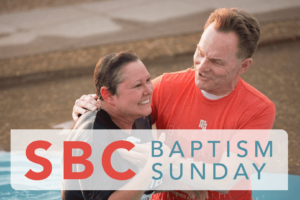
The process of joining the SBC is itself rather loose. Those requirements can be found here. The denomination will, on rare occasions, disfellowship a church for various reasons including, in most recent examples, blatant racism and sexual abuse. But maintaining an affiliation with the SBC is largely based on the church’s continuing financial support. So when a church, for whatever reason, chooses to end its affiliation with the SBC, there is very little in the way of official procedure to be followed. Most simply, the church determines to end its financial support.
Leaving Because The SBC Is Not Liberal Enough?
In the last half-century, numerous churches have left the SBC. Perhaps the largest egress of congregations came in the wake of the “Conservative Resurgence” during the early 1980’s. Over the course of the resurgence, various reports indicate that anywhere from 1,900 to 3,000 moderate or liberal churches ended their affiliation with the SBC. Many departed and formed the Cooperative Baptist Fellowship. These congregations left the SBC because the Convention was apparently becoming too conservative, with the matter of the inerrancy of Scripture being a foremost issue.

Ralph D. West (L); Charlie Dates (R)
In just the last few years, other churches have also ended affiliation for the SBC for being too conservative particularly with regard to its alleged lack of progress on matters of race. In 2020 pastor Charlie Dates led his Chicago church, Progressive Baptist Church, to leave the SBC. Also in 2020, Ralph D. West of The Church Without Walls in Houston, TX moved his congregation to leave the denomination. These departures were largely prompted by a collective statement by all six SBC seminary presidents that declared critical race theory, an “analytical tool” adopted and approved during the SBC’s 2019 convention (Resolution 9), as incompatible with the Baptist Faith And Message. Again, for these two pastors, the SBC was viewed as too conservative on matters of race.
However, in the aftermath of the 2019 Convention during which Resolution 9 was adopted, it wasn’t the presumed conservative slant of the SBC that caused churches to leave. Rather, it was the readily evident slide into liberalism that was the catalyst.
Departing A Matter Of Righteous Indignation
One such notable departure was Grace Life Church Of The Shoals, an Alabama church pastored by Jeff Noblit. Pastor Noblit, in his statement of departure to his church, noted three particular concerns. He noted the increasing leniency by the Convention on the matter of complementarianism, particularly with denominationally accepted and endorsed prominence of then SBC diva Beth Moore. Noblit also called out the adoption of Resolution 9 as an indication of the SBC’s descent into liberalism. He proclaimed critical race theory as an “unbiblical, God-hating, God-rejecting” theory. He further noted the egregious book endorsements of SBC pastors, including Robert Jeffress, Jack Graham, and Jerry Falwell, Jr., of “pastor” Paula White, “a three-time married pastor who calls herself a prophet.”
“The great idol of Southern Baptist life is pragmatism.” Jeff Noblit
Resolution 9 As A Mobilizing Catalyst
The 2019 passage of Resolution 9 which endorsed and adopted Critical Race Theory, particularly within SBC seminaries, created a stir throughout the sound churches throughout the Convention. Perhaps the most visible and platformed response came from Founders Ministries through various blogs, podcasts, and a must-see documentary outlining the direct threat to the gospel represented by CRT. The effort to educate SBC churches about the threat was favorably continued throughout 2020 when the Convention was not able to gather as it annually does due to the Covid “pandemic.”
By the time the 2021 Convention arrived, many Southern Baptist pastors and laymen were mobilized specifically to respond to the prior gathering’s passage of Resolution 9. A decades-long record attendance at the 2021 Convention was largely driven by their desire to see Resolution 9 fully rescinded. Such a rescission, however, was not to be had. That failure, coupled with numerous other concerning issues from the convention, had many pastors and messengers departing with the pressing question of faithfulness. “What do we do now?”

Josh Buice
G3 Church Network Option Gets SBC Pastors’ Interest
In response to the rightly worrisome issues resulting from the 2021 Convention, many SBC churches are seriously pondering and praying whether now is the time for them to leave the SBC. A number of SBC pastors participated in a recent G3 Zoom call with Josh Buice and Virgil Walker of G3 Ministries. Buice, himself pastor of an SBC church, was using the Zoom meeting to introduce the forthcoming G3 Church Network. The G3 Church Network, to be announced in early August, will not be a formal denomination but will offer a depth of theological resources and curricula, outlets for missions support, and pastoral forums, events, retreats, and training.
Buice neither encouraged nor discouraged SBC pastors in the meeting on the matter of their church’s continued affiliation with the SBC. However several SBC pastors participated in the meeting and were clearly searching for options should their churches determine to disfellowship from the denomination.
In addition to the pastors looking toward the inauguration of the G3 Church Network, one church has made the decision to depart from the SBC. The reasons given by its pastor are compelling.
One Church’s “Departure From The SBC”
On Sunday, July 4, Jonathan Sims, pastor of Shelbyville Mills Baptist Church in Memphis, TN, delivered a message

Jonathan Sims
entitled “Departure From The SBC.” Sims’ message is straightforward, sound, and reasoned. You are encouraged to listen to it HERE.
While much of evangelical social media is absorbed in the ongoing scandalous, sinful, and, to-date, unrepentant behavior of newly elected SBC President Ed Litton, the reasons for Sims’ leading his church’s departure from the SBC are much, much more comprehensive in scope.
Sims’ denominational resume is weighty. A fifth-generation pastor, he has pastored three Southern Baptist Churches in his 30+ years as a pastor. He has never been a member of any church other than a Southern Baptist one. A graduate of Southwestern Theological Baptist Seminary, Sims was a young pastor and supporter during the Conservative Resurgence of the 1980’s. But as of July 4, 2021, Sims is no longer a Southern Baptist.
“You will know them by their fruits. Grapes are not gather from thorn bushes nor figs from thistles, are they? So every good tree bears good fruit, but the bad tree bears bad fruit. … So then you will know them by their fruit.”
Matthew 6: 16-17, 20
Grounding his departure message to his church in Jesus’ words in Matthew 6, Sims stated, “There’s no need to be in doubt as to the condition of the Southern Baptist Convention. Jesus gave us the acid test, and it is fruit. We know without a doubt where the Southern Baptist Convention is today because we can see the fruit.”
Shelbyville Mills Baptist Church had decided after the 2019 Convention to drastically defund the local SBC association, the Tennessee Baptist Convention, and the national Convention. They gave, said Sims, “$100 per year for two years” which was “down from tens of thousands of dollars.”
“But with this year’s convention in Nashville a couple of weeks ago,” he continues, “the Southern Baptist Convention has reached a point that my conscience will not longer allow me to even be loosely affiliated” with it. “I believe,” he stated to his church, “it’s time for us to formally withdraw from the Southern Baptist Convention.”
Sims proceeds to outline the unconscionable fruit of the Southern Baptist Convention that has led him to guide his church from affiliation with it.
“When the doctrines of grace and the glorious atoning sacrifice are not set clearly before men’s minds, so that they may feel their power, all sorts of evils follow. It is terrible to me that this dreadful blight should come upon our churches; for the hesitating are driven to destruction, the weak are staggered, and even the strong are perplexed. The false teachers of these day would, if it were possible, deceive the very elect.”
C.H. Spurgeon
“No doctrine of Redemption that in any way casts the slightest shadow over the high mountain of Divine Sovereignty can be tolerated for a moment.”
A.W. Pink
The Bad Fruit of Decisional Regeneration
The first fruit, and certainly most vividly obvious reason he gives, is “unhealthy, unbiblical local churches.” The clearest evidence of this, according to Sims, is the excessive employment of “decisional regeneration” which, he says, “I believe is a false doctrine.”
Decisional regeneration is the false soteriological view “that all a person has to do to be saved is make a decision, to walk an aisle of a church, to follow the pastor’s lead, to parrot back to him a sinner’s prayer. The result of this wrong-headed theology is that our churches are packed with unregenerate, unconverted church members that don’t think biblically and thus they don’t act biblically.”
Sims notes that he was twice a victim of this biblically faulty doctrine. “’I was the product of this growing up. I was taught ‘raise your hand.’ I was taught ‘catch my eye’ I was taught, ‘walk the aisle’ And in each case I was taught, ‘Pray this prayer’ and ‘did you mean that in your heart?’ And twice i did that. Twice I made a decision, as Southern Baptists would call it, but I wasn’t regenerated. I wasn’t converted. My life did not bear righteous fruit. And Jesus says you will know a tree by the fruit it bears.
The Baptist Faith and Message (BF&M) declaration regarding regeneration is clearly contradicted by the prevalent practice of SBC churches. Sims notes that the statement given in the BF&M is “what I believe about conversion. That’s Holy Spirit regeneration.”
Regeneration, or the new birth, is a work of God’s grace whereby believers become new creatures in Christ Jesus. It is a change of heart wrought by the Holy Spirit through conviction of sin, to which the sinner responds in repentance toward God and faith in the Lord Jesus Christ. Repentance and faith are inseparable experiences of grace.
Repentance is a genuine turning from sin toward God. Faith is the acceptance of Jesus Christ and commitment of the entire personality to Him as Lord and Saviour.
Baptist Faith and Message (2000) Section 4, Paragraph A
The abundant practice of decisional regeneration by the SBC is directly contrary to what its statement of faith professes. It is also egregiously contrary to Scripture. “Now it’s obvious to me,” Sims states, “that the way our churches function and the way the leadership of our denomination functions that this is no longer the case, and it hasn’t been for decades. The spiritual state of our local churches prove it.”
The Bad Fruit of Spontaneous Baptism
Decisional regeneration is a foundational problem throughout the SBC, but it is being practically and effectively buttressed by an even more egregious practice increasingly popular in recent years within the SBC. That is the denominationally condoned practice of spontaneous baptism. Sims rightly declares that, alongside decisional regeneration, spontaneous baptism is “equally damaging, and, I want to say, damning.”
Sims defines spontaneous baptism as “the practice of baptising someone on the spot simply because they respond 
The practice of spontaneous baptism is not merely isolated in random churches scattered about the SBC. Sims cites numerous SBC elite who endorse the practice, including Johnny Hunt, J.D. Greear, who held a “Fill The Tank Sunday,” Ronnie Floyd, Ted Traylor, and Randy Davis (of the Tennessee Baptist Convention). They have “all endorsed this practice of spontaneous baptism.
The practice of spontaneous baptism is not one merely theologically or theoretically assessed by Sims. He has experience with it.
“I’ve seen the fruit of this firsthand. A family member of mine, one of my nieces, went to one of these services, and she made a spur of the moment decision that … she wanted to get baptized. No one counseled with her. They didn’t have time. No one spoke to her of sin. No one spoke to her of repentance. No one spoke to her of following Christ or of the call of discipleship.
Listen, they didn’t even know her name. As a matter of fact, when she got into the baptistry, the man baptizing had to ask her, ‘Now young lady, what’s your name?’ And then they baptized her. They gave her a “I have decided” t-shirt and if she hangs on to it, that’ll be about all she got out of it, as evidenced by the fact that her life has never changed.
This makes me extremely angry. I call it religious abuse. It’s religious abuse of a person’s soul. And it’s driven by the fact that the Southern Baptist Convention is being led by men that are drunk – literally drunk – with pragmatism and a church growth lust that will do almost anything to quote ‘get our numbers up’. This is a false gospel and it takes advantage of, and gives false assurance to, souls. And it’s unthinkable.”
“If I had nothing but that practice alone,” Sims plainly declared, “that would be sufficient reason for me to depart the Southern Baptist Convention.” He notes that in his 30-plus years as a pastor, “I’ve never baptized a single person that I would feel comfortable baptizing the first time I talked to them.”
The Bad Fruit Of “Bloated Membership Rolls”
The obvious fruit of just these two widely prevalent and denominationally promoted practices is the next fruit pointed to by Sims. “Bloated membership rolls,” he states, are the result of these “man-centered techniques of evangelism.” “Our churches,” he continues, “are literally flooded with lost people.”
The SBC’s rotund church rosters of its unregenerate membership are quite easily recognized. “We have 47,592 Southern Baptist Churches,” Sims points out. “In those 47,592 churches, we have a membership of 14,089,947 souls. The average attendance on a given Sunday in the Southern Baptist Convention is 4, 439,792 souls. In other words, thirty percent of our folks come to church.”
“For over ten million people, it means nothing to be a member of a Southern Baptist Church.” Jonathan Sims
“An Unregenerate Denomination”
Sims’ observation of current reality within the SBC regarding membership is not a new reality. Though the numbers were different, a 2005 article entitled “Southern Baptists, An Unregenerate Denomination” by Jim Elliff identified the same self-induced SBC malady. Elliff plainly makes much the same point: “Missing Christians are no Christians.” Elliff’s conclusion? “Most Southern Baptists need raising from the dead.”
Sims would agree with Elliff’s decade-and-a-half-old assessment. The situation has not improved because the SBC’s Scripture-defying pragmatism has only accelerated. Says Sims, “The truth is, a person can be a member of a Southern Baptist Church, basically live any way they choose to live and not even come to church and still hold membership in a Southern Baptist Church. This proves that things like decisional regeneration and spontaneous baptism – read my lips – are a colossal failure.”
The Bad Fruit of “Unqualified And Unbiblical Leadership”
Sims continues to outline numerous bad fruit evidences that are vividly displayed, and often even extensively promoted, within the SBC. He remarks about “unqualified and unbiblical leadership” in churches that disregard the Scriptural qualifications for elders and deacons. Sims rightly notes that “Satan controls many churches because of these things.”
The Bad Fruit of the SBC’s Church Plant Model
In case you haven’t been paying attention, the rancid pragmatism of the church growth movement rightly connected with such names as the now-retiring Rick Warren and the now self-disgraced Bill Hybels hasn’t gone away. Church growth strategies fueled by unbiblical pragmatism is alive and well in the Southern Baptist Convention. Now, however, it’s remonikered as church planting. In the SBC, the North American Missions Board (NAMB) is directly responsible, largely through its SEND Network, to fuel pragmatic church planting across the country.
Sims notes the worldliness of the current church plant model employed by NAMB:
“The kinds of churches and pastors that the North American Mission Board is currently planting with Cooperative Program dollars, we wouldn’t even allow to come to this pulpit. We wouldn’t even allow to teach Sunday school here in our church. Worldly. Carnal. Pragmatic. Man-centered. Culturally-minded and molded churches that resemble the world more than they do the Lord Jesus Christ … They’re not Bible driven churches. They’re pragmatic and cultural driven church plants that are more interested in cultural relevance that biblical fidelity.”
The Bad Fruit Of Discarding Church Discipline
In his 2019 statement of departure, Pastor Noblit noted three particular reasons the SBC had “blackballed” his church. In addition to employing a plurality of elders, a longstanding and biblical model for a church, and holding to the biblical doctrines of grace, Noblit notes that the biblically obedient practice of church discipline caused his church to be “pushed away [by the SBC] forcefully for many, many years.”
It is the widespread disregard, or more properly, the widespread disobedience to Scripture in discarding church discipline which Sims likewise notes as evidentiary bad fruit.
“When discipline leaves the church, Jesus goes with it.” J.L. Dagg
Sims summarizes the collective bad fruit when it comes to the matter of biblical church discipline.
“Think about this for a moment. Think about the fruit. Decades and decades of decisionism, and now add on top of that spontaneous baptism as an evangelistic strategy. Think about the numbers of unregenerate people that have been added to church rolls, and made deacons, and Sunday school teachers, and elders, and pastors. And then, when they live out their nature, which is unconverted, when they live a life of open, scandalous sin, the church completely ignores it and acts as if the sin does not exist.”
The obvious reality of this is clear to Sims. “Without the practice of consistent church discipline, a church cannot be a true New Testament church.”
The Bad Fruit Of Wokeism, “The Most Wicked Tool”
The Convention’s 2019 adoption of Resolution 9 in which the SBC formally endorsed critical race theory (CRT) was nothing short of the adoption of what Sims calls “the most wicked tool Satan has ever churned out since I’ve been in the ministry.” He acknowledges that many, perhaps most, messengers to the 2019 gathering “didn’t know what they were affirming” and “didn’t understand what it was.” However, Sims cautions, “But you make no mistake about it. The leadership did. And if the head be sick, the whole body’s going to be sick.”
Sims is blunt and biblically correct about CRT. “After three decades of pastoring a local church,” he states, “I have never seen anything more demonic and hellish than critical race theory… Critical race theory is not uniting us, it’s dividing us. Critical race theory is not making us love each other, it’s making us hate each other. Critical race theory is not causing us to embrace one another, it’s causing us to be suspicious of one another.”
Thus when the 2021 Convention rolled around many messengers were rightly catalyzed to rescind Resolution 9. The churches of the SBC had “two years to think about this. We’ve had two years to chew on it. We’ve had two years to get educated.”
Yet, as Sims continues, “we went back to the convention this year in Nashville and the convention could not even pass a resolution to repudiate Resolution 9, because the leadership wouldn’t let it happen. … Resolution 9 should have been repented of. It should have been rejected. It should have been repudiated. Someone should have stood up and said, ‘We made a terrible mistake. We didn’t understand what we were doing. We stepped out of bounds. This is wrong. It’s inconsistent with the gospel of Jesus Christ and we come today to make that right.’ But there was absolutely nothing like that.”
A Continuing Catalog Of Compromise
The bad fruit highlighted by Sims to his congregation did not only include decisional regeneration, spontaneous baptisms, bloated rolls of unregenerate membership, unqualified and unbiblical church leadership, the rotten pragmatism of church planting, the abandonment of church discipline, and the denominational embrace of the ungodly ideology of critical race theory. Sims also spoke to other equally egregious areas of doctrinal compromise and bad practice. He spoke about the softening views on abortion, particularly from the leadership of the SBC. Sims included discussion on the issue which was included by Noblit in 2019 as part of his reasoning for leaving the SBC, namely, the evident shift on complementarianism. The SBC has just elected, after all, a man who has co-preached with his wife.
“This will be the last message I get to preach for a while.” Kathy Litton, quoted by Pastor Sims
“I’m going to lead the convention in a more inclusive view of complementarianism.” Ed Litton, quoted by Pastor Sims
Sims further excoriates the very powerful and very present reality of SBC politics within the leadership of the Convention. He cites the “temper tantrum” of Russell Moore’s egress with his leaked letters “just before the convention to sway the vote on the presidency.” Sims opposes the politics of the North American Mission Board that “paid its church planters with Cooperative Program funds to come to the convention and vote for Ed Litton.” “That,” he said, “is just wrong.” He further noted the conspicuous “conflict of interest” of Danny Akin endorsing Litton stating that “It is not right for a man receiving a salary from the Southern Baptist Convention, especially a seminary president, to endorse a presidential candidate.”
Akin’s endorsement was certainly a conflict of interest, but it was his self-serving interest that doubtlessly motivated him. Ed Litton just happens to be a trustee of Akin’s seminary. Politics indeed.
The political posturing and self-promotion also noted as egregious was “parading a sexual abuse victim around the floor of the Southern Baptist Convention to make yourself appear to be the great savior and liberator.” To this unnamed pastor, Sims had a direct word: “If you really, really, really are concerned about sexual abuse, then this is what I’ve got to say: Teach your church about church discipline and, for heaven’s sake, practice it. Or you’re just simply pluming out your peacock feathers.”
“I believe the Southern Baptist Convention to be beyond repair and not worthy of my time, energy, and resources. … I come to you today with this recommendation: that we formally withdraw from the Southern Baptist Convention.” Jonathan Sims
The SBC Fruit Of Darkness, Disobedience, & Deception
The reality of the SBC is that there are scores more Southern Baptists than there are Southern Baptist Christians. Looking with a wide view of the SBC, the faithful Christian will not see the “narrow path” but the “broad road that leads to destruction.” As Pastor Sims has noted, the matter of his church’s continued cooperation with the SBC finally, after this most recent Convention, surpassed the threshold of his conscience.
Indeed, the matter of a church’s continuance with the SBC is a matter of conscience. In his G3 Church Network Zoom meeting, Josh Buice made clear that whether a church should stay or leave the SBC is a matter of conscience for the pastor and leadership of the local church. It is a matter of prayer and following the Lord in obedience to the teaching of His Word.
While many faithful pastors and sound churches populate the SBC, they are the clear minority. Many will stay and fight the theological and cultural liberalizing now predominant undercurrent SBC leadership. Yet many are pondering what faithfulness to the Lord on their part must now mean. Should they decide to depart their affiliation with the SBC, no doubt the decision will be made on much the same basis as was Sims’. It will made in obedience to the Lord’s wisdom: “You will know them by their fruit.”
For Sims and his church, at least, no longer could there be fellowship of light with darkness because the fruit of darkness, disobedience, and deception is just too evident in the Southern Baptist Convention. As our Lord made clear, “every good tree bears good fruit, but the bad tree bears bad fruit.” Many churches now are astutely assessing that, when it comes to the Southern Baptist Convention, they’re dealing with “the bad tree.” Indeed for many God has become an exile from the SBC and, it seems, the elite leadership are pleased to have it so.







0 Comments